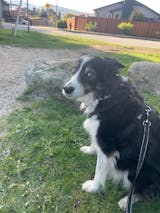You love your dog and want to give your beloved pet the best life possible. Your dog loves to walk, play, run, and eat. So you indulge your dog however and whenever you can. Taking long adventurous walks in nature and having an extra helping of dog food or favorite treat – all seems to make your dog smile. However, often many of us are susceptible to giving our dog too much of the good things. In other words, feeding our dogs too much. Just as being overweight contributes to health problems in humans, the same is true for our dogs. When your dog is overweight, a number of health problems can occur including
joint health issues, mobility concerns, breathing issues, and a lack of energy. We want you and your dog to enjoy a long life together and this means you need to be proactive about your dog’s health. There are lots of factors about your dog’s health that you can’t control, but weight is one that is definitely within your control. Give your dog the best life possible – keep the extra pounds off and watch your dog move easily and live longer.
How to Know if Your Dog is Overweight Before you do anything with respect to your dog’s weight, we urge you to contact your veterinarian. Get a thorough assessment from your veterinarian and do discuss weight management with your vet. If your veterinarians suggests you monitor your dog’s weight or that your dog is overweight, you can do some simple home review to monitor you dog’s weight and shape.
-
Feel your dog’s backbone and ribs. If it’s hard to feel your dog’s backbone and ribs, this can be a sign that your dog is overweight.
-
Look at your dog from the side. Look for a sagging stomach – this is an indicator that your dog is carrying extra weight.
-
Look at your dog from above. When you look at your dog from above, you should see that your dog has inward curves between the back of the rib cage and hips. If you don’t see what looks like a natural waist, this can indicate your dog is overweight.
-
Weigh your dog. Your veterinarian can give you guidelines on a healthy weight range for your dog. Your veterinarian will consider your dog’s age, breed, and overall health condition when giving you this healthy weight range.
Along with physical indicators, there are some dog lifestyle habits that can indicate that your dog is overweight. Pay attention to
how easily your dog moves, his overall energy levels, his breathing, desire to play or walk, and overall health. Just like humans, when your dog is overweight, his entire lifestyle can be compromised.
How to Help Your Dog Lose Weight It’s very important that you do not undertake a weight loss plan for your dog without first consulting your veterinarian. Remember, dogs are not humans – so you must approach your dog’s weight loss with a different mindset. We’ve put together some general recommendations on how you can help your dog lose and maintain his weight – however, do not follow these blindly without first consulting your veterinarian. Some breeds have a propensity to gain weight or to have a bigger heftier shape. Discuss this with your veterinarian. As well, talk to your veterinarian about tips for maintaining or losing weight for your senior dog – remember, your senior dog likely won’t be able to increase his exercise or might have other health concerns to consider.
-
Exercise. The benefits of daily exercise for your dog are overwhelming. Integrate regular walks, play time, and games into your dog’s daily life. Your dog’s energy levels will increase. His joint health will improve by strengthening his muscles, joints, and ligaments. Your dog’s mood will improve thanks to the stimuli that comes from being outdoors and playing games. And to top it off, regular exercise can help your dog lose weight. Remember, don’t rush into an aggressive exercise routine. If your dog is overweight, you have to take things slowly and ease him into his new exercise patterns. Be careful that you’re not putting too much stress on his joints, breathing, or overall health with too much exercise. Talk to your veterinarian about the best way to get started with a healthy and sustainable dog exercise program.
-
Food. Just like humans, dogs like to eat. Discuss portion control with your veterinarian and follow the recommended guidelines that will help your dog lose weight at a healthy rate. Crash diets don’t work for humans and they definitely don’t work for dogs. Remember, your dog needs to eat to have the energy to go out for walks, to play tag, and to function on a daily basis. Never ever withhold food or skip meals. Discuss the best ways to manage your dog’s food intake with your veterinarian. Don’t forget, that like humans, dogs eat when bored – so make sure you’re giving your dog the toys and attention he needs to be engaged and interested.
-
Treats. There is nothing quite like a treat. Pay attention to the number of treats you give your dog. Consider switching to an all-natural dog chew that serves double-duty as a reward and a natural joint supplement. Think about cutting treats in half – this way your dog is still getting a reward but just a little bit less. Try substituting different types of rewards – such as an extra cuddle, a new toy, or a nice relaxing brush.
Your dog is your best friend. Your dog relies on you to care for his health and well-being, therefore it’s up to you to make sure your dog is living his best life possible. If you’re concerned about your dog’s weight or have noticed behavioral changes that indicate a health problem – talk to your veterinarian before making any changes. A healthy dog is a happy dog – give your dog the best health possible.





